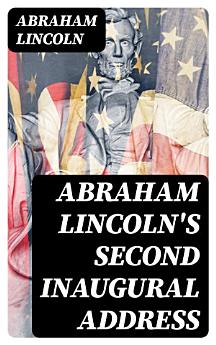Abraham Lincoln's Second Inaugural Address
Abraham Lincoln
Sep 2022 · DigiCat
Ebook
101
Pages
family_home
Eligible
info
reportRatings and reviews aren’t verified Learn More
About this ebook
In Abraham Lincoln's Second Inaugural Address, delivered on March 4, 1865, the tone and content reflect a pivotal moment in American history, amidst the Civil War's devastation. The address is characterized by its profound moral introspection and rhetorical brilliance, employing concise, poignant language that underscores themes of unity, reconciliation, and the enduring struggle against slavery. Lincoln navigates the complexities of war and peace, presenting a vision of healing while acknowledging the deep-seated divisions that have torn the nation apart, making it a quintessential text in both political and literary studies. Abraham Lincoln, the 16th President of the United States, possessed a keen understanding of the human condition shaped by his humble beginnings and legal advocacy. His experience as a frontier lawyer and a statesman informed his compassionate yet resolute vision for America. The address reflects Lincoln's personal trials and political philosophy, culminating in a poignant call for unity and a moral reckoning, situated within the broader context of American democracy and the fight for equality. This seminal work is highly recommended for readers interested in American history, political rhetoric, and ethics. Lincoln's address serves not only as a historical document but also as a timeless meditation on justice and humanity, encouraging contemporary readers to reflect on the ongoing struggle for equality in a divided nation.
About the author
Abraham Lincoln, the 16th President of the United States, is not conventionally known as an 'author' in the literary sense, but his speeches and writings have been meticulously studied and compiled, given their historical importance and rhetorical mastery. Born on February 12, 1809, in a humble log cabin in Kentucky, Lincoln rose through the ranks of American politics with remarkable resilience and a self-educated background. While he did not write books, his speeches, letters, and proclamations are significant texts that reflect his political thought and eloquent use of language. Among these, 'Abraham Lincoln's Second Inaugural Address,' delivered on March 4, 1865, stands out as a profound example of his oratorical skills and statesmanship. In this address, Lincoln contemplated the tragedies of the American Civil War and sought to unite the nation with 'malice toward none' and 'charity for all.' It remains a hallmark of American rhetoric, emphasizing themes of reconciliation and justice. Lincoln's ability to express complex ideas with clarity and moral force not only shaped the character of the nation during its most turbulent period but also left a lasting imprint on American literary and political culture (Basler, 1953). His work reflects not a literary career but the powerful intersection of leadership and communication that has come to define his legacy.
Rate this ebook
Tell us what you think.
Reading information
Smartphones and tablets
Install the Google Play Books app for Android and iPad/iPhone. It syncs automatically with your account and allows you to read online or offline wherever you are.
Laptops and computers
You can listen to audiobooks purchased on Google Play using your computer's web browser.
eReaders and other devices
To read on e-ink devices like Kobo eReaders, you'll need to download a file and transfer it to your device. Follow the detailed Help Center instructions to transfer the files to supported eReaders.







